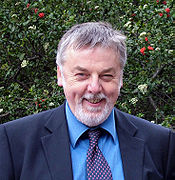
Geoffrey Hodgson
Encyclopedia

University of Hertfordshire
The University of Hertfordshire is a new university based largely in Hatfield, in the county of Hertfordshire, England, from which the university takes its name. It has more than 27,500 students, over 2500 staff, with a turnover of over £181m...
, and also the editor-in-chief of the Journal of Institutional Economics.
Prof. Hodgson is recognized as one of the leading figures of modern critical institutionalism
Institutional economics
Institutional economics focuses on understanding the role of the evolutionary process and the role of institutions in shaping economic behaviour. Its original focus lay in Thorstein Veblen's instinct-oriented dichotomy between technology on the one side and the "ceremonial" sphere of society on the...
which carries forth the critical spirit and intellectual tradition of the founders of institutional economics, particularly that of Thorstein Veblen
Thorstein Veblen
Thorstein Bunde Veblen, born Torsten Bunde Veblen was an American economist and sociologist, and a leader of the so-called institutional economics movement...
. His broad research interests span from evolutionary economics
Evolutionary economics
Evolutionary economics is part of mainstream economics as well as heterodox school of economic thought that is inspired by evolutionary biology...
and history of economic thought
History of economic thought
The history of economic thought deals with different thinkers and theories in the subject that became political economy and economics from the ancient world to the present day...
to Marxism
Marxism
Marxism is an economic and sociopolitical worldview and method of socioeconomic inquiry that centers upon a materialist interpretation of history, a dialectical view of social change, and an analysis and critique of the development of capitalism. Marxism was pioneered in the early to mid 19th...
and theoretical biology
Biology
Biology is a natural science concerned with the study of life and living organisms, including their structure, function, growth, origin, evolution, distribution, and taxonomy. Biology is a vast subject containing many subdivisions, topics, and disciplines...
. He first became known for his book Economics and Institutions: A Manifesto for a Modern Institutional Economics (1988), in which modern 'mainstream' economics is criticized, and the call is made to revise economic theory on the new grounds of institutionalism. His reputation has become enhanced owing to the trilogy of more recent books - Economics and Utopia (1999), How Economics Forgot History (2001) and The Evolution of Institutional Economics (2004) all of which built Hodgson's arguments into a more rounded and powerful critique of mainstream economic theory.
In 2000 Hodgson co-founded The Other Canon
The Other Canon
The Other Canon Foundation is a center and network for research of heterodox economics founded by Erik Reinert. The name refers to the founders' message of there being another economic canon, alternative to the ruling neoclassical economics...
, a center and network for heterodox economics
Heterodox economics
"Heterodox economics" refers to approaches or to schools of economic thought that are considered outside of "mainstream economics". Mainstream economists sometimes assert that it has little or no influence on the vast majority of academic economists in the English speaking world. "Mainstream...
research, with - amongst others - main founder and executive chairman Erik Reinert.
Institutions according to Hodgson
According to Hodgson, institutions are the stuff of social life. He defines them in a 2006 article by saying that institutions are “the systems of established and prevalent social rules that structure social interaction”. Examples of institutions may be language, money, law, systems of weights and measures, table mannersTable manners
Table manners are the rules of etiquette used while eating, which may also include the appropriate use of utensils. Different cultures observe different rules for table manners...
and organizations (for example firms). Conventions, that may be included in law, can be regarded to be institutions as well (Hodgson, 2006, p. 2).
What Hodgson considers important about institutions is the way that they structure social life and frame our perceptions and preferences. They also create stable expectations. He argues that: “Generally, institutions enable ordered thought, expectation, and action by imposing form and consistency on human activities.” Consequently, institutions enable as well as constrain action.
Hodgson regards institutions as systems of rules. Broadly understood a rule is “a socially transmitted and customary normative injunction or immanently normative disposition, that in circumstances X do Y" (Hodgson, 2006, p. 3). This means that to be effective a rule has to be embedded in dispositions or habits. Mere decrees are not necessarily rules in this sense. Habits and customs help to give a normative status to a legal rule that can help a new law to become effective. In the process of social interaction norms are constantly changed (Hodgson, 2006, pp. 3–4)
Books
- (With Thorbjoern Knudsen) Darwin's Conjecture: The Search for General Principles of Social and Economic Evolution (University of Chicago Press, 2010). ISBN 9780226346908.
- Economics in the Shadows of Darwin and Marx (Edward Elgar, Cheltenham, 2006). ISBN 978 1 84542 497 8. ISBN 1 84542 497 2.
- The Evolution of Institutional Economics: Agency, Structure and Darwinism in American Institutionalism (Routledge, London, 2004). ISBN 0-415-32253-7
- A Modern Reader in Evolutionary and Institutional Economics (Edward Elgar Publishing, Cheltenham and Northampton, 2002) ISBN 1-84064-474-5
- How Economics Forgot History: The Problem of Historical Specificity in Social Science (Routledge, London, 2001). ISBN 0-415-25717-4. Also in a Chinese edition.
- Evolution and Institutions: On Evolutionary Economics and the Evolution of Economics (Edward Elgar Publishing, Cheltenham and Northampton, 1999) ISBN 1-85898-813-6
- Economics and Utopia: Why the Learning Economy is Not the End of History (Routledge, London, 1999) ISBN 0-415-19685-X
- Economics and Evolution: Bringing Life Back Into Economics (University of Michigan Press and Polity Press, 1993). ISBN 0-472-10522-1
- Economics and Institutions: A Manifesto for a Modern Institutional Economics (Polity Press, Cambridge, and University of Pennsylvania Press, Philadelphia, 1988). ISBN 0-7456-0277-0
- After Marx and Sraffa: Essays in Political Economy (Macmillan Press, London, 1991). ISBN 033354224X
- The Democratic Economy: A New Look at Planning, Markets and Power (Penguin, Harmondsworth, 1984). ISBN 0140224955 ISBN 0140229455
- Capitalism, Value and Exploitation (Martin Robertson, Oxford, 1982). ISBN 0855204141
- Labour at the Crossroads (Martin Robertson, Oxford, 1981). ISBN 0855204621
- Socialism and Parliamentary Democracy (Spokesman, Nottingham, 1977. Also in Italian, Spanish, Turkish and Japanese editions) ISBN 0851242073

